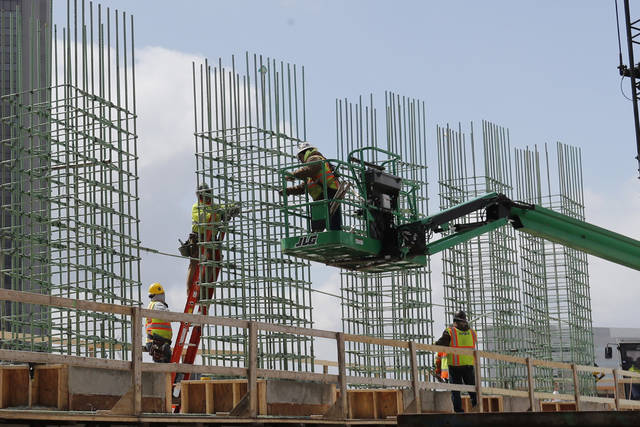
WASHINGTON (AP) — Looking beyond the $1.9 trillion COVID relief bill, President Joe Biden and lawmakers are laying the groundwork for another top legislative priority — a long-sought boost to the nation’s roads, bridges and other infrastructure that could run into Republican resistance to a hefty price tag.
Biden and his team have begun discussions on the possible outlines of an infrastructure package with members of Congress, particularly mindful that Texas’ recent struggles with power outages and water shortages after a brutal winter storm present an opportunity for agreement on sustained spending on infrastructure.
Gina McCarthy, Biden’s national climate adviser, told The Associated Press that the deadly winter storm in Texas should be a “wake-up call” for the need for energy systems and other infrastructure that are more reliable and resilient.
“The infrastructure is not built to withstand these extreme weather conditions,” said Liz Sherwood-Randall, a homeland security aide to the president. “We know that we can’t just react to extreme weather events. We need to plan for them and prepare for them.”
A White House proposal could come out in March.
“Now is the time to be aggressive,” said Transportation Secretary Pete Buttigieg, a former South Bend, Indiana, mayor who knows potholes.
At a conference with state and local highway officials Thursday, he referred to the often-promised, never-achieved mega-initiative on roads, bridges and the like from the Trump administration.
“I know you are among those who are working and waiting most patiently, or maybe impatiently, for the moment when Infrastructure Week will no longer be a kind of Groundhog’s Day promise — but actually be something that delivers generational investments,” he said.
Much of America’s infrastructure — roads, bridges, public drinking and water systems, dams, airports, mass transit systems and more — is in need of major restoration after years of underfunding, according to the American Society of Civil Engineers. In its 2017 Infrastructure Report Card, it gave the national infrastructure an overall grade of D+.
Both chambers of Congress will use as starting points their unsuccessful efforts to get infrastructure bills through the last session.
Democrats passed a $1.5 trillion package in the House last year, but it went nowhere with the Trump administration and the Republican-led Senate. A Senate panel approved narrower bipartisan legislation in 2019 focused on reauthorizing federal transportation programs. It, too, flamed out as the U.S. turned its focus to elections and COVID-19.
Biden has talked bigger numbers, and some Democrats are now urging him to bypass Republicans in the closely divided Congress to address a broader range of priorities urged by interest groups.
During the presidential campaign, Biden pledged to deploy $2 trillion on infrastructure and clean energy, but the White House has not ruled out an even higher price tag. McCarthy said Biden’s upcoming plan will specifically aim at job creation, such as with investments to boost “workers that have been left behind” by closed coal mines or power plants, as well as communities located near polluting refineries and other hazards.
“He’s been a long fan of investing in infrastructure — long outdated — long overdue, I should say,” White House press secretary Jen Psaki said Thursday. “But he also wants to do more on caregiving, help our manufacturing sector, do more to strengthen access to affordable health care. So the size — the package — the components of it, the order, that has not yet been determined.”
In the House, Rep. Sam Graves, the top Republican on the transportation panel, said Republicans would be open to a larger package as long as it didn’t greatly add to the national debt.
But many lawmakers oppose an increase in the federal gas tax, one way to help pay for the spending, while groups such as the Chamber of Commerce argue against increasing taxes on companies during a pandemic.


